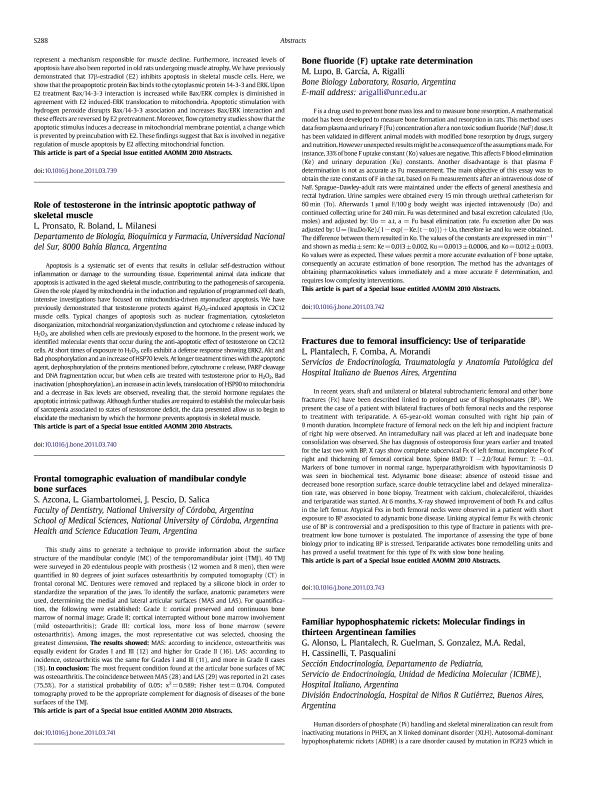Artículo
Role of testosterone in the intrinsic apoptotic pathway of skeletal muscle
Fecha de publicación:
06/2011
Editorial:
Elsevier Science Inc
Revista:
Bone
ISSN:
8756-3282
Idioma:
Inglés
Tipo de recurso:
Artículo publicado
Clasificación temática:
Resumen
Apoptosis is a systematic set of events that results in cellular self-destruction without inflammation or damage to the surrounding tissue. Experimental animal data indicate that apoptosis is activated in the aged skeletal muscle, contributing to the pathogenesis of sarcopenia. Given the role played by mitochondria in the induction and regulation of programmed cell death, intensive investigations have focused on mitochondria-driven myonuclear apoptosis. We have previously demonstrated that testosterone protects against H2O2-induced apoptosis in C2C12 muscle cells. Typical changes of apoptosis such as nuclear fragmentation, cytoskeleton disorganization, mitochondrial reorganization/dysfunction and cytochrome c release induced by H2O2, are abolished when cells are previously exposed to the hormone. In the present work, we identified molecular events that occur during the anti-apoptotic effect of testosterone on C2C12 cells. At short times of exposure to H2O2, cells exhibit a defense response showing ERK2, Akt and Bad phosphorylation and an increase of HSP70 levels. At longer treatment times with the apoptotic agent, dephosphorylation of the proteins mentioned before, cytochrome c release, PARP cleavage and DNA fragmentation occur, but when cells are treated with testosterone prior to H2O2, Bad inactivation (phosphorylation), an increase in actin levels, translocation of HSP90 to mitochondria and a decrease in Bax levels are observed, revealing that, the steroid hormone regulates the apoptotic intrinsic pathway. Although further studies are required to establish the molecular basis of sarcopenia associated to states of testosterone deficit, the data presented allow us to begin to elucidate the mechanism by which the hormone prevents apoptosis in skeletal muscle.
Palabras clave:
Testosterone
,
Apoptosis
,
Skeletal Muscle
,
Mitochondria
,
Intrinsic Pathway
Archivos asociados
Licencia
Identificadores
Colecciones
Articulos(CCT - BAHIA BLANCA)
Articulos de CTRO.CIENTIFICO TECNOL.CONICET - BAHIA BLANCA
Articulos de CTRO.CIENTIFICO TECNOL.CONICET - BAHIA BLANCA
Citación
Pronsato, Lucía; Boland, Ricardo Leopoldo; Milanesi, Lorena Magdalena; Role of testosterone in the intrinsic apoptotic pathway of skeletal muscle; Elsevier Science Inc; Bone; 48; 6; 6-2011; 288-288
Compartir
Altmétricas




